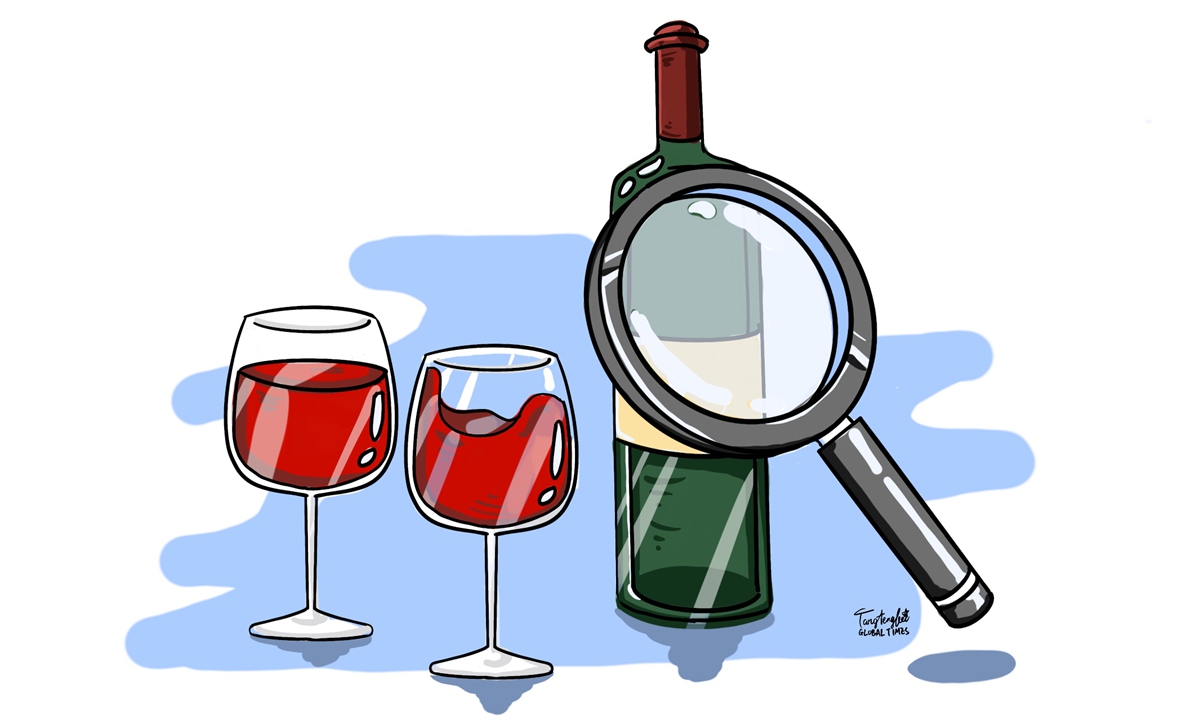How will anti-dumping probe affect Australian wine makers?
Source: Global Times Published: 2020/8/19 20:52:20

Illustration: Tang Tengfei/GT
Editor's Note:While wine imports from Australia to China have surged in recent years, the import price has fallen. At the request of domestic wine associations, China's Ministry of Commerce has launched an investigation into imports of Australian wine. How will the investigation be conducted? And how will the probe affect Australian wine makers? Here are two Chinese trade experts' assessments:
Li Chunding, a professor and head of the Economics and Trade Department with the College of Economics and Management at China Agricultural University
The investigation reportedly involves 10 Australian wine makers and nine domestic import companies. Investigators will focus on whether wine imports from Australia were dumped, the extent of the dumping margin, and the impact on domestic industries.
There are three possible results from the investigation: If the Australian importers are indeed found to be dumping, anti-dumping duties and even import restrictions will be imposed in accordance with the anti-dumping rules of the WTO. If no dumping was found to have taken place, there will be no related measures. And finally, in the event that China's wine industry association pulls back the appeal, the investigation will be suspended.
During the probe, there will be little impact on the Australian wine industry, but it is likely to affect market expectations. However, if anti-dumping duties and even import restrictions are adopted, it will raise the price of Australian wine, reduce consumption and demand, and impact the Australian wine industry.
China is Australia's largest export market and largest source of imports. China-Australia bilateral trade relations play a significant role in the Australian economy.
There is no fundamental competition and contradiction between China and Australia. The Regional Comprehensive Economic Partnership (RCEP) that is expected to reach an agreement and begin implementation this year will further deepen bilateral trade and economic ties.
Tu Xinquan, dean of the China Institute for WTO Studies at the University of International Business and Economics in Beijing
Anti-dumping investigations generally have two phases. During the first phase, related departments will make decisions based on material collected from Chinese companies involved. The assessment will be based around whether there was dumping and whether those actions are harming domestic companies. Initial decisions will be based on whether to impose anti-dumping duties or other restrictions.
In the second phase, the investigation will collect materials from the related Australian companies via surveys and papers. An updated decision about whether to impose duties or restrictions will be made based on this second round of fact collection.
Australian wine companies can actively hand in appeals to maintain their legal rights and interests in the China market. They can also hire lawyers to assist them in cooperating with investigators, and have access to the relevant papers and hearings during the process.
China is a crucial market for Australian wine makers. If in the end anti-dumping duties are imposed, the Australian wine industry will suffer heavy consequences. Given the fierce competition in the industry, Australian wines were earning a bigger market share due to cost performance in the past. Now there are plenty of competitors, including Chile, Argentina and the US.
In terms of trade, China and Australia have great complementarity. Although Australia has been wavering under US' political pressure, China will not politicize trade issues. The wine anti-dumping investigation is an appeal by China's wine industry association and in accordance with international trade legal framework, let's not make incorrect associations here.
Posted in: EXPERT ASSESSMENT